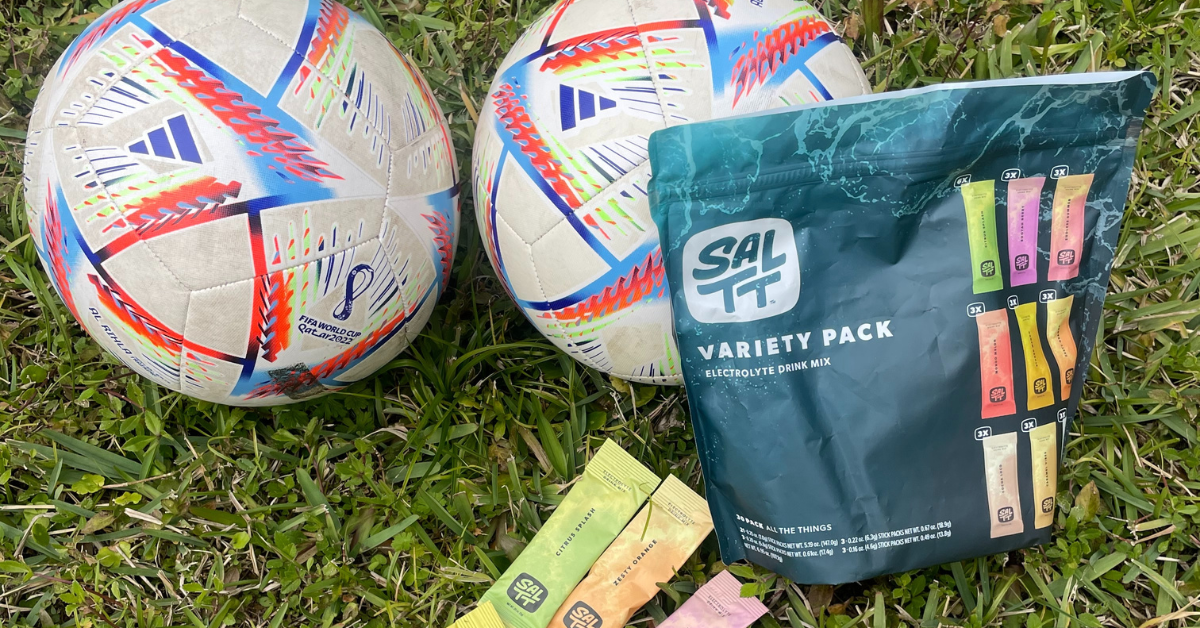Since we launched SALTT Electrolyte Drink Mix, we've had quite a few people ask how it compares to LMNT®. Let's talk about it.
Disclaimer: we LIKE the team at LMNT® and the product they make.
We personally know many of the team that founded LMNT and we have used their electrolytes for years. Frankly, it’s good stuff and if we had not made our own flavored electrolyte drink we would STILL be using LMNT. That being said, we do think our product has some advantages.
Flavor and Taste

The main difference between SALTT and LMNT is the flavor and the way it tastes. Most people who have tried both brands tell us that SALTT is not as sweet, not as tart/sour, and not as salty (in the same volume of water).
You could get both to about the same flavor intensity by using a larger volume of water with LMNT (or less water with SALTT); and consequently, that same volume of water with SALTT would make the flavor even more mild. While there are certain people who like a stronger flavor and stronger salty taste, we designed SALTT to be milder without needing a ton of extra water.
Electrolyte Content (and other nutrients)
|
Nutrient |
SALTT |
LMNT |
Why SALTT is different |
|
Calories |
3 |
10 |
Fewer calories |
|
Sodium |
969mg |
1000mg |
Comparable amounts of sodium |
|
Total Carbohydrate |
0.65g |
2g |
Fewer carbs |
|
Potassium |
415mg |
200mg |
2x the potassium to support healthy blood pressure |
|
Magnesium |
178mg |
60mg |
3x the magnesium to support healthy sleep and muscle health |
|
Sulfate |
162mg |
0mg |
Including sulfate makes for a more complete blend of electrolytes |
Note that the figures above are for SALTT Zesty Orange and LMNT Orange Salt.
Ingredients
Magnesium

The magnesium in SALTT is included as part of the spray-dried salt water and comes as magnesium chloride. This form of magnesium occurs naturally and is highly bioavailable, meaning that humans can easily absorb and use it (as compared to a poor source like magnesium oxide). Magnesium chloride is water soluble.
LMNT uses magnesium malate, which is also a highly bioavailable form of magnesium. It is made in a lab by combining malic acid with elemental magnesium.
Although these two forms are generally considered very comparable, SALTT contains significantly more—just shy of three times the amount as LMNT. This makes for a healthier mix of electrolytes and means that the benefits of magnesium are more available to SALTT drinkers: better sleep, preventing or reducing muscle cramps, and more.
Citric Acid and Malic Acid

The fruity flavors of SALTT use malic acid, which is the main acid in many fruits. It has a more potent sour taste and is not as controversial as citric acid. (We were surprised at how much better it tastes, as well!)
LMNT uses citric acid in the fruity flavors to improve the taste and increase tartness. Citric acid is somewhat "controversial" and there is some discussion as to how different types of citric acid are made and where they come from with some people taking a definitive stance against products that use citric acid.
Sweeteners

SALTT uses a purified form of stevia called RebD and RebM, which has no contamination from the proteins and other compounds that might be problematic for people with a seasonal ragweed allergy. (You can read more about that here.)
LMNT lists "stevia leaf extract" on the ingredients. Unfortunately, we aren't able to find any further information about exactly what kind of stevia extract is used.
Both LMNT and SALTT also have an unflavored and unsweetened version available if you want to avoid any sweeteners.
Maltodextrin / Binding Agents

LMNT uses a small amount of maltodextrin in the flavoring to help bind the flavor into a powdered form.
SALTT does not contain any maltodextrin. We work exceptionally hard to make certain that none of our products have ANY maltodextrin at all, not even a trace. This is extremely difficult to do because maltodextrin is commonly used as a binder and bulking agent so that liquid flavors can be made into a powder.
The manufacturing industry loves the stuff, but we don’t want it in our products. Instead, we use acacia gum. It works nearly as well as maltodextrin and even though it’s a fiber that humans can’t digest, your gut bacteria turns it into butyrate and other short-chain fats. (It’s cool stuff!)
If you have any questions about SALTT or the ingredients we use, our customer service team (real life human beings) are available at hello@saltt.com to help however they can!

